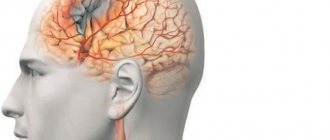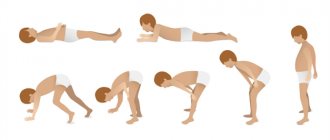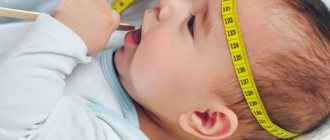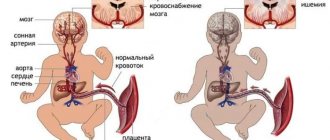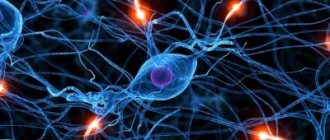Home → Information about diseases → Child mental retardation: signs, causes, treatment of mental retardation
Delayed mental development is characterized by: a predominance of mostly childish gaming interests, limited ideas about the world around us, inability for intellectual activity and immaturity of thought processes, which in the future seriously complicate the learning process. It is important to promptly identify mental retardation and provide medical and educational assistance to a child with mental retardation.
Why don’t all children develop “correctly”?
The reasons for this phenomenon are very diverse.
- Chromosomal pathologies (genetic cause). For example, children with Down syndrome always lag behind their peers, although this can manifest itself in different ways: from mild to severe mental retardation. In addition to Down syndrome, there are other chromosomal disorders that also affect the formation of intelligence and the acquisition of new skills.
- Birth injuries. Many children during pregnancy and childbirth experience acute or chronic lack of oxygen, which primarily affects the brain.
- The influence of negative factors during pregnancy. Working in hazardous industries, taking serious medications, alcoholism, smoking, drugs, and infections suffered by the expectant mother do not have the best effect on the formation of the fetal nervous system.
- Autism and autism spectrum disorders. Autistic children have great problems communicating with other people, their perception of the world is impaired, social interaction is limited or completely impossible (in severe forms of the disorder). Experts are still arguing about the causes of autism, so it cannot be unambiguously attributed to either mental illness or genetic disorders.
- Other mental disorders and diseases, including hereditary ones.
- Difficult psycho-emotional situation in the family. For the proper development of a preschooler, it is necessary that he grows up in love and receives enough attention from those people who surround him. If there are serious problems in the family (lack of funds, housing, seriously ill relatives, physical or psychological violence, alcoholism, and so on), this seriously affects the children. In the absence of any diseases or abnormalities, children in destructive families often have all the signs of psychological abnormalities.
- Pedagogical neglect. This term denotes a situation when no one is particularly concerned with the baby and does not make any effort towards his development and upbringing. Unfortunately, this is not an exceptional situation in modern young families, where mom and dad are often more busy with gadgets and computer games than with their own children.
- Serious somatic diseases. Sometimes they affect psychological health directly, sometimes indirectly, because if a baby, almost from birth, spends more time in hospitals than communicates and develops, this cannot but affect his psyche and skills.
- Impairment of sensory functions such as hearing and vision. Deafness and blindness already in the first days of life limit the baby’s knowledge of the world; in the future, this situation only gets worse; the baby does not have enough methods at his disposal to interact with the environment, so development may slow down.
- Psychotrauma. A serious shock suffered at an early age can “roll back” intellectual development far back.
Common symptoms of mental retardation
1) Children under 3 years of age may experience slow development of psychomotor functions, indicating mental retardation.
2) A child with mental retardation experiences difficulties in communicating with peers and adults: he has difficulty listening, he cannot formulate his own thoughts, and does not assimilate social norms and rules of a particular game. Mental retardation also manifests itself in joint games and group work on school assignments. The child cannot establish communication and even when playing with other children he stays apart, practically not discussing what is happening with the rest of the group.
3) With mental retardation, disturbances in the emotional-volitional sphere often occur. Emotions are short-term, unstable, and may not correspond to the real situation. During conflicts, the child becomes aggressive, and negative emotions are directed towards a specific person, and not towards an action. Such children are often quick-tempered, touchy and too easily vulnerable (for example, they cry because of bad grades or slight reproaches from adults).
4) Problems with learning in children with mental retardation arise due to insufficient development of mental functions. It is difficult for a child to concentrate; he cannot analyze information, generalize, or draw conclusions.
5) Mental retardation often manifests itself in delayed memory development. The child is unable to learn a poem intended for children of his age, confuses the days of the week, forgets his own address, names of relatives and other important information.
6) At primary school age, play motivation continues to predominate in children with mental retardation, while the cognitive motivation required at their age is, on the contrary, absent. During lessons, these children quickly get tired and begin to get distracted, since it is almost impossible to interest them in the topic of the lesson.
7) Mental retardation may affect everyday skills. Children with mental retardation are sometimes unable to brush their teeth, get dressed, tie their shoelaces, eat, pack things for school, etc. on their own.
Mental retardation in children - symptoms
It is impossible to diagnose mental retardation at home; this should be done by a doctor. However, the characteristics of children with mental retardation are striking even to attentive parents:
- Difficulties in communication, lack of desire to interact with other children, difficulties in socialization;
- It is difficult for a preschooler or schoolchild to maintain attention on one type of activity or the teacher’s explanations; he is constantly distracted and has difficulty perceiving educational material;
- Emotional instability, vulnerability, such children get offended at any failure, withdraw into themselves, and have a very difficult time “moving away” from the insult;
- The baby has difficulty mastering skills typical for his age - dressing, personal hygiene, independent feeding;
- Excessive aggressiveness, anxiety, unusual fears or even suspiciousness;
- In early infancy, deviations may be noticeable not only mentally, but also physically - children with such disorders later begin to hold their heads, crawl, stand, and speak;
- Any speech disorders;
- Poorly developed or absent imaginative thinking, there are problems with logic and memory.
Diagnosis
Retardation is not diagnosed in children at birth. Babies do not have any physical defects, so parents most often do not notice developmental delays, because...
always highly appreciate the potential of their baby. The first signs begin to be noticed when children go to preschool or school. Usually, teachers immediately notice that such children cannot cope with the academic load and do not master the educational material well.
In some cases, a delay in the development of emotions is clearly expressed, but intellectual impairment is not expressed. In such children, emotional development is at the initial stage of formation and corresponds to the mental development of a young child.
At school, such children have difficulty complying with the rules of behavior, with an inability to obey and follow generally accepted rules. For such children, the predominant type of activity is still play.
Moreover, thinking, memory and attention reach the norm in development - this is the main feature of such children. In other cases, there are obvious deficiencies in intellectual development.
They have no problems with discipline, they are diligent, but it is difficult for them to master the curriculum. Memory and attention are at a low level, and thinking is primitive.
A developmental delay can only be diagnosed using a comprehensive psychological and pedagogical examination, which involves psychotherapists, defectologists, psychologists and speech therapists.
A special feature of the approach is that the level of development of mental processes, motor activity, motor skills is assessed, and errors in the field of mathematics, writing and speech are analyzed.
Parents should contact a specialist when the first symptoms occur. Each stage of development corresponds to norms; close attention must be paid to their violation. Deviations from the norm:
- At the age of 4 months to 1 year, the child does not react to his parents, no sounds are heard from him.
- At 1.5 years old, the baby does not speak basic words, does not understand when his name is called, and does not understand simple instructions.
- At the age of 2 years, the child uses a small set of words and does not remember new words.
- At 2.5 years old, a child’s vocabulary is no more than 20 words; he cannot form phrases and does not understand the names of objects.
- At the age of 3 years, a child cannot make sentences, does not understand simple stories, and cannot repeat what has been said. The baby speaks quickly or, conversely, drawls out his words.
- At the age of 4 years, the baby does not have coherent speech, does not operate with concepts, and concentration of attention is reduced. Low level of auditory and visual memory.
You should also pay attention to the emotional sphere. Typically, these children exhibit hyperactivity. Children are inattentive, get tired quickly, and have a low level of memory.
They also have difficulty communicating with both adults and peers. Symptoms of mental retardation can also occur when the central nervous system (CNS) is malfunctioning.
Mental retardation in children - symptoms
Many parents and even teachers think that mental retardation and mental retardation are one and the same thing. But it is not so.
Experts speak of mental retardation (MR) if the mental retardation progresses or does not go away until 4 years of age and beyond.
At the same time, children with mental retardation are able to use the help of adults, transfer these skills to new types of activities and apply them independently. Mentally retarded children do not delve into the essence of what they read or hear; they do not have such a need, unlike children with developmental delays. Mental and intellectual retardation with MR is practically irreversible, while ordinary developmental delay can be corrected with sufficient attention and effort on the part of adults.
Causes of mental retardation
In medicine, various causes of mental retardation in children are identified:
1. Biological:
- pregnancy pathologies: severe toxicosis, intoxication, infections, injuries;
- prematurity;
- intrauterine fetal hypoxia;
- asphyxia during childbirth;
- infectious, toxic, traumatic diseases at an early age;
- genetic predisposition;
- trauma during childbirth;
- lagging behind peers in physical development;
- somatic diseases (disturbances in the functioning of various organs);
- damage to certain areas of the central nervous system.
2. Social:
- restriction of life activity for a long time;
- mental trauma;
- unfavorable living conditions;
- pedagogical neglect.
Depending on the factors that ultimately led to mental retardation, several types of disease are distinguished, on the basis of which a number of classifications have been compiled.
Types of ZPR
Experts classify the types of mental development disorders of early childhood in different ways. Most often, domestic medicine uses the following classification of ZPR:
- Constitutional (due to heredity);
- Somatogenic (occurs during or after an illness);
- Psychogenic (related to the climate in the family, relationships with parents and other close relatives);
- Cerebral-organic (results from disorders of the brain).
Each type not only has its own causes, but also differs in symptoms, course characteristics, and treatment methods.
Diagnostics
CPR is most common in preschool children. In the first years of life, such a diagnosis is not made, since babies each develop at their own pace, so a lag in mastering one skill can be compensated for in another area. At the same time, it is worth paying attention to the signs of cerebral palsy in newborns, because a baby with such a disease may later lag behind peers physically and mentally. But perinatal encephalopathy, which neurologists love to diagnose, does not always lead to intellectual impairment.
Signs of mental retardation become especially pronounced after three years of age. The same delay in speech development in children 3-4 years old should be a reason to contact a specialist.
The diagnosis is made simultaneously by several doctors - a neurologist, psychologist, speech therapist, defectologist (sometimes a psychotherapist). In this case, several important criteria are assessed:
- thinking, memory;
- speech development;
- perception, knowledge of objects, orientation in space;
- self-care skills;
- creative, playful activities;
- ability for social interaction.
In addition, various tests are used in diagnosis (including IQ determination), sometimes the results of EEG, MRI and CT scan of the brain.
Classification of mental retardation
Under the influence of external factors, metabolic processes in the brain structure can be disrupted, which leads to the development of mental retardation or mental retardation.
Mental retardation is classified into three degrees of severity:
- debility - with a given degree of mental impairment, the child is able to achieve independence in care and acquire housework skills. The main difficulties will begin at school: children with this diagnosis cannot study successfully according to the school curriculum, but they are able to learn to count, read, and write. They can master a simple profession and perform simple tasks;
- imbecility - moderate mental retardation or mental retardation. Self-care skills are quite difficult for such children. They learn basic movements poorly and cannot always understand speech. Such a child needs special pedagogical training and attention during adolescence and childhood. Mature people suffering from imbecility need serious supervision;
- idiocy is a deep stage of mental retardation, which consists in the fact that human development stops at the age of three years. Such children are not capable of following and understanding rules, requirements, and instructions. They are characterized by gross deviations in the motor sphere. Fecal and urinary incontinence often occurs. Serious neurological abnormalities may occur. As a rule, the causes of idiocy are organic (hereditary, genetic), but sometimes this condition appears after receiving a severe brain injury.
Treatment and prevention
A timely diagnosis and treatment will help a preschooler with a developmental disorder catch up with his peers and then go to a regular, non-correctional school. In this case, parents, a psychologist, speech therapist, psychiatrist or psychotherapist must become “one team”. Quite often, drug therapy and homeopathy are used for such conditions.
But the biggest burden still falls on the shoulders of the parents. They need to accept their baby as he is, without trying to make him fit the standards, but at the same time gently helping him adapt to the team, learn to cope with the tasks of specialists and master self-service skills. Without the benevolent participation of the family, neither medications nor the best specialists will help a preschooler with mental retardation.
The same goes for prevention. No matter how the early development of children is sometimes criticized, in reasonable doses and in due time it is absolutely necessary, including for the prevention of sexually transmitted diseases in children. The symptoms and treatment of this disorder largely depend on how mom and dad behave and how much time and effort they devote to their baby.
Home page
Methods for correcting delayed psychospeech development
Experts can offer you and your child a variety of compensation options. However, it is important to remember that only in combination they can give results. Corrective actions include medication (sometimes) and psychological and pedagogical methods (mandatory).
To improve brain function, “build” neurons and stimulate the speech center, medications are prescribed. Despite the fact that they have long been “heard” by many parents who are concerned about the delay in the development of their child, you cannot take them on your own! Prescriptions are made by a neurologist based on the specific situation.
A speech pathologist works with a child, developing his thinking, memory and speech. The correctional course includes various lessons that stimulate mental and speech development:
- finger games;
- cerebellar stimulation;
- didactic games to correct emotional development;
- games for attention, memory stimulation;
- articulation gymnastics, improving sound pronunciation;
- expansion of vocabulary and conceptual stock.
Each situation has its own training program, based on the child’s characteristics and correction requirements. It is pedagogical work that should be the basis of corrective measures. Parents will have to create an environment at home that is favorable for the child’s development, complete tasks, play, read and study. But everything will pay off handsomely. The main thing is not to waste time.




